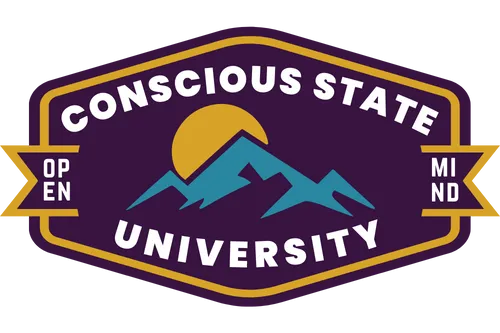Why I Started Conscious State University
ORIGIN STORY
A few years ago, I was a former head of marketing turned executive coach — for nearly two decades, working with leaders and executives of businesses of all sizes, from start-ups to Fortune 500 companies. I had it all— the family, the house, the cars, the businesses and the cool friends. And yet, some discontent was creeping in…
I was constantly in fight-or-flight mode.
I felt pulled in multiple directions.
My nervous system was a wreck.
Hyper-vigilant thoughts kept me up at night.
I felt chained to my to-do lists.
I was burdened by others’ expectations and projections.
And I desperately wanted to take a vacation totally unplugged for once!
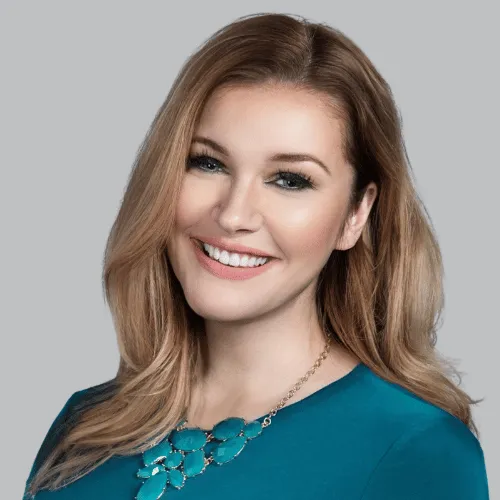
Christie Turley, Founder
I realized that despite checking all of the boxes on life’s success checklist, I wasn’t truly happy or fulfilled. I started to ask soul-searching questions:
“Who am I really?”
“What is my purpose?”
“How can I feel fulfilled in my work?”
Then I Almost Died
At this time, my husband and I had just completed a period of struggle involving seven years of infertility and the accompanying depression. (Interestingly, studies show that the stress levels of infertility patients rival those of cancer patients.) I finally got pregnant and four weeks before my due date, I had complications. I went through 96 hours of labor— and I almost died in labor. Luckily, a beautiful healthy daughter was born. And after I recovered physically from the ordeal, the resulting PTSD from the near-death experience was something I didn’t want to admit to anyone.
But I Went Right Back to Work
Instead, I dove right back into work— and just four weeks after giving birth, I traveled to a mastermind meeting with some fellow entrepreneurs. Among discussions of business strategies and financial forecasts, it was my turn for a “hot seat” — a time to ask for potential solutions to a business challenge. I bared my struggle to the room and confessed that I had been playing the part of a successful businesswoman to the world, yet I felt void of direction and purpose. I explained that I had recently crossed a major finish line— a huge goal of mine had been achieved (I left out the fact that I almost died in the process). By all accounts, I should have been happy, but I wasn’t. I had it all— the business, the income, and now the family.

"I had been playing the part of a successful businesswoman to the world, yet I felt void of direction and purpose."
I Found Out I Wasn't Alone
Among other highly successful 7-, 8- and 9-figure entrepreneurs, my dissatisfaction resonated. Despite our successful circumstances, many were feeling a sense of emptiness arising from a lack of purpose. One person related they had just exited their company for a 9-figure payday and felt the same void. Another person sympathized because they had left a lucrative career and felt directionless before they started their new company. Another one shared being faced with a recent diagnosis of Parkinson’s Disease and it made them question their reality.
Their stories ranged from feeling mild stress to anxiety to depression. With no purpose or something bigger than them driving them, they felt meaningless and empty.
My A-Ha Moments of Clarity
This was my A-Ha Moment, the catalyst that shocked me into realizing that I was chasing the shadows of “Surface Happiness” instead of actual happiness. And I wasn’t alone — many of the successful leaders were experiencing the same thing— they just weren’t talking about it because they feared they might look weak.
Interestingly, as a condition of the advice I was soliciting, I asked that no one suggest “meditation” as a solution, or I would punch them in the face! This was another A-Ha moment. Isn’t it interesting that what I had the most resistance to (and even threatened mild violence about) was the very solution that would help me turn around my life? Deep down, I must have known this already. Later, I found a quote from Joseph Campbell that describes this personal experience as a universal theme: “The cave you fear to enter holds the treasure you seek.”
"Isn’t it interesting that what I had the most resistance to was the very solution that would help me turn around my life?"
Meeting Up with Resistance
I gave meditation a try. At first, I sat in silence. After all, isn’t that what meditation is? (Or so I thought…) As I sat in silence, my thoughts wouldn’t stop racing. It was impossible to think about “nothing.” I felt I was doing it wrong because my mind just kept thinking thoughts.
So I did more research and found out there are more than 20 types of meditation, including visualization, guided meditations, breathwork meditations, affirmation meditation…you can even “walk and think” and that is called a walking meditation!
Then I learned about:
The inventors that used a form of meditation for new invention ideas…
The celebrities who use it to calm themselves before taking the stage…
The athletes that use visualization to win Olympic medals…
Obviously, monks weren’t the only ones doing this!
Then I learned about the science-based studies and benefits (I highlight these in the Free Guide, “Breaking Bad Decisions.”)
I persevered. I soon found myself being more patient, decisions were no longer rash, and I became more receptive to intuitive insights. The benefits of mindfulness started spilling into my professional life, helping me make decisions that genuinely benefitted my team and business. I even started to sleep better!

"The benefits of mindfulness started spilling into my professional life, helping me make decisions that genuinely benefitted my team and business. I even started to sleep better!"
95% of our decisions are made UNconsciously
Fascinated by the shift within me and being a lifelong learner, I zoomed in on the science behind those shifts. My exploration led me toward the science of happiness, neuroscience and psychology.
What I learned is that 95% of our decisions are made UNconsciously. This is because the decisions are simply made by default — influenced heavily by previous experiences, ingrained patterns, and built-in biases. This leads to reactive responses, rather than conscious choices grounded in the present reality.
I dug deeper into the enormous impacts of subconscious programming, emotional wounds, and even trauma - both minor and major - on individuals, their ability to lead, and on organizations as a whole.
The Habitual Reflexes That I Thought Were My Personality...
As I went further down the rabbit hole, I immersed myself in studying, meditation, mindfulness, neuro-linguistic programming (NLP), Cognitive Behavioral Therapy (CBT), Hypnotherapy (CH), and practical approaches to teach others how to do meditation and breathwork.
"I dug deeper into the enormous impacts of subconscious programming, emotional wounds, and even trauma - both minor and major - on individuals, their ability to lead, and on organizations as a whole."
With every piece of knowledge, clarity deepened. I started to notice patterns and behaviors in my life that I “thought” were my personality. I made a huge discovery — they weren’t part of my personality at all! Rather, they were reactionary, habitual behaviors that I created to navigate past difficulties.
I was shocked to realize that these “unconscious” traits were the driving force behind 95% of the decisions in my life (according to the research). Many of them were survival and coping mechanisms brought on by being in “fight or flight” mode for long periods of time, including a childhood of abuse as well as participation in a high-control religion. In other words, they were all psychological reflexes that I adopted to keep myself safe.
These are some of these habitual behaviors I unearthed:
People-pleasing sprang from a desire for external validation. Through mindfulness, I became more aware of my internal motivations and could make choices based on authentic desires rather than others’ approval. I also learned to set healthy boundaries.
Overachievement and proving myself came from deep-seated insecurities and the need to affirm my self-worth. Through mindfulness, I learned to accept myself and no longer feel a need to constantly prove my value. I also learned what really motivated me intrinsically.
Perfectionism flowed from fear of failure, criticism, and rejection. With mindfulness, I embraced imperfection, openness and vulnerability as part of the human experience.
Difficulty with emotions was deeply rooted in suppressing my feelings to avoid being seen as weak or losing control. Mindfulness helped me get more comfortable with all my emotions, so they no longer controlled my decisions.
Fear of being seen and speaking up arose from hypersensitivity to judgment. Mindfulness allowed me to separate others' perceptions from my own self-image.
Not knowing what I truly want came from adapting to please others at my own expense. Now I tune inward more to align with my authentic desires and values.
Reluctance to engage with others stemmed from past hurts that led to distrust. Through mindfulness, I learned to be more open and forgiving.
Judging and criticizing rose out of arrogance, insecurity and my own unresolved anger. I have more humility, patience and insight now.
Mindfulness not only helped me identify these patterns embedded in my psyche but also sparked a profound inner transformation. It grounded me in the present, helping me discern between reactionary fears based on past experiences and my higher wisdom or intuition. Gradually, I felt myself feeling more patient and less reactive to unmet expectations. (I may have also experienced less RBF…)
Unearthing My Authentic Self
My curiosity, combined with the mindfulness approach, didn't just guide me to understand how my decisions were significantly influenced by unconscious patterns and conditioning, but also helped me unlearn these patterns and create a deeply satisfying and fulfilling life.
It wasn't therapy, but mindfulness and meditation that triggered this evolution, specifically to:

"It wasn't therapy, but mindfulness and meditation that triggered this evolution."
Unlearn conditioning and unconscious patterns. I discovered how my reactions were often rooted not in the present moment, but rather in past fears and learned behaviors. With the techniques I discovered, I deprogrammed these patterns.
Cultivate self-trust. I learned to tune into my authentic self and connect with my needs, desires, and values at a deeper level and as well as deepen the bond with my intuition and purpose.
Reframe past experiences into novel perspectives and awareness. With mindfulness, I learned to revisit past experiences from a fresh viewpoint, releasing resentment and negativity and claiming the lessons they offered.
Express my thoughts, emotional states, and belief systems in a healthier, more authentic manner.
Ground myself in the present instead of being anchored by the past or anxious about the future.
Establish healthy boundaries. I learned to say 'no' when needed and 'yes' when my heart truly wanted to, creating a balance that respects both my needs and those of others.
Self-Acceptance. I learned to sit with my complex emotions, understand, and process them without spiraling down into judgment or guilt.
Enhance Decision-Making. Through mindfulness and meditation, I was able to turn down the noise of past conditioning and even current stressors. This clearer headspace empowered me to make decisions that were not just reactions but thoughtful responses anchored in my present reality and intuition.
I Became a Better Leader
And all of this did not just transform me as an individual; it refined my leadership skills. I evolved into a better leader — with better decision-making, creative problem-solving and off-the-charts intuition. I became more conscious of my choices and decisions. I started feeling more satisfied and fulfilled. My confidence soared as I wrote my first book and launched a podcast.
Leaders Thrive on Decision-Making to Get Results
I had another big A-Ha… As a leader, there’s nothing more important to my success than my ability to make decisions. Wouldn't you agree? After all, decisions determine actions—and actions determine results.
And if there’s something “hidden” behind the decisions because it’s unconscious (beneath awareness), then the best use of my time is to become conscious of what is really driving my decisions, so I can make more empowered ones. Right? I explain how to do this in the Free Guide, “Breaking Bad Decisions.”
What Was Really Driving My Decisions?
I discovered that it's like our minds are running on autopilot. Instead of running a smart, sophisticated automatic driving program like in a Tesla self-driving car, we’re running an automatic “mental program” or habitual reactive pattern based on a stressful experience in the past.
Imagine if a Tesla were programmed UNconsciously like a human’s mind! You might base a decision upon a past accident instead of present road conditions… and that could lead to a sudden overcorrection instead of a calculated turn.
Remember those behavioral patterns I mentioned? Turns out, those "UNconscious" patterns were driving my decisions as a leader:

"Imagine if a Tesla were programmed UNconsciously like a human’s mind! You might base a decision upon a past accident instead of present road conditions… and that could lead to a sudden overcorrection instead of a calculated turn."
People-Pleasing: Leaders who constantly seek external validation risk making decisions based on the approval of others, rather than what is genuinely best for the organization.
Overachievement: Leaders driven by deep-seated insecurities may make choices based on constantly validating their self-worth, rather than aligning decisions with the team or company's needs.
Perfectionism: Fear of failure and criticism can lead perfectionist leaders to be overly cautious or risk-averse, potentially stunting innovation and growth.
Difficulty with Emotions: Leaders who suppress their feelings can become reactive rather than thoughtful in their decision-making, leading to choices that may not be in the best interest of their team or organization.
Fear of Being Seen: Leaders afraid of judgment may hesitate to make bold decisions, inhibiting the organization's potential for innovation and growth.
Lack of Self-Awareness: Leaders who consistently adapt to please others risk losing touch with their authentic desires and values, leading to decisions that may not resonate with their true leadership style or the needs of the organization.
Reluctance to Engage: Past hurts and distrust can cause leaders to act defensively or isolate themselves, obstructing effective collaboration and decision-making.
Judging and Criticizing: Leaders who harbor a habit of criticism, born out of arrogance or insecurity, risk making decisions that alienate team members and damage team cohesion.
Charting the Path to Conscious Leadership
The urgency of this work cannot be overstated. As Forbes puts it, unresolved emotional wounds and trauma eat away at productivity, costing U.S. businesses an astounding $300 billion annually. Furthermore, the fallout seeps into the cultural foundations of organizations, with toxic cultures cited as the top reason employees quit their jobs, according to a recent survey.
We’ve all heard the saying, “People don’t quit their jobs; they quit their bosses.” Margaret Heffernan nailed it when she said: "The biggest irony is that we think we are individuals, but one person's trauma can damage an entire organization."
“People don’t quit their jobs; they quit their bosses.”
The transformative journey of personal healing and extensive immersion in neuroscience and psychology initiated a significant metamorphosis in my career, ultimately giving birth to the Conscious State University. As its founder, my vision extends beyond training conscious leaders. It's about cultivating empathetic ecosystems, emotionally intelligent leadership and, above all, a nurturing sense of belonging.
Evolving Through Conscious State University…
At Conscious State University, we strive to resolve this issue at its root. As leaders and employees reconcile their inner conflicts and past conditioning, they peel away layers of past conditioning, evolving into conscious, empathetic team players. This transformation creates conscious cultures, where respect and belonging aren’t just buzzwords, they're the heart and soul of the workplace.
This consciousness is more than just a state of mind, it's a gamechanger for the bottom line. Companies fostering conscious cultures have been noted to outperform the S&P by a whopping 1000% over a decade (Firms of Endearment by Sisodia et al). Even more compelling is the finding that the top 10 companies in the Global Empathy Index saw their value double and generated 50% more earnings than those at the bottom of the Index (Harvard Business Review, 2015).
At Conscious State University, we are shaping workplaces into ecosystems of emotional health, personal growth, and innovation, ultimately strengthening bottom lines and creating fulfilling work environments where every team member not only feels they belong but also thrives. We offer in-person workshops and a unique online curriculum designed to increase conscious decision-making and improve overall mental health in the workplace.
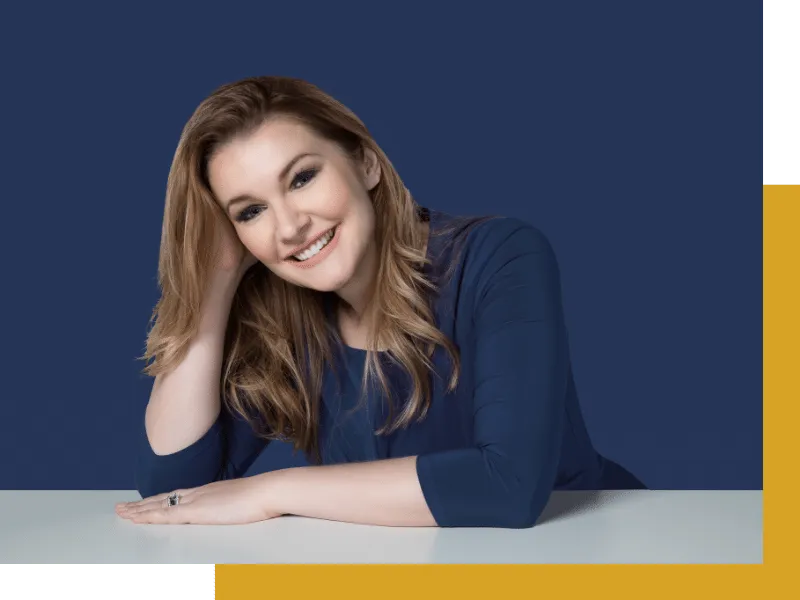
"We created a unique curriculum designed to increase conscious decision-making and improve overall mental health in the workplace."
We help leaders and their teams become better decision-makers, tap into their intuition and become the best version of themselves.
Christie Turley, Founder

Christie is the author of The Intuition-Led Business, an expert speaker on the
subconscious mind’s effects on decision-making and the founder of Conscious State University.
While Christie ran her own marketing firm, she helped sell more than $3 Billion dollars of products and services during 17 years of operation. Additionally, for her own business ventures, she has reached 8-figures in online sales.
Christie has consulted with several Fortune 500 and INC 500 companies as well as thousands more small businesses with 7-, 8- and 9-figure revenues.
Christie's clients have included companies in the education, technology, CPG, retail, health, legal and serviced-based industries as well as non-profit organizations.
Christie has an online reach of over 300,000 people across her LinkedIn, Facebook, Instagram, email list and podcast.
Christie is a dynamic speaker who has shared the stage with many New York Times best-selling authors.
Official Bio
Christie Turley, Founder
Christie Turley guides visionary leaders to live fully in their genius, so they can improve decision-making and deliver greater profits, influence and impact.
Earlier in her career, Christie helped two international start-ups to achieve triple-digit growth, earning placements in the INC 500. During the next two decades, she launched hundreds of award-winning marketing campaigns for start-ups and Fortune 500 brands and helped to sell more than $3 Billion dollars of products and services.
These earlier experiences provided Christie with unique insights into why high performers experience burnout and failure: they ignore their subconscious mind's role in decision-making. She believes that conscious decision-making is the keystone to effective leadership, engaged teams and business innovation.
Christie Turley is the author of the book, The Intuition-Led Business, which offers a framework for unlocking the intuitive and subconscious minds, and she is founder of Conscious State University, an online learning platform that teaches leaders and teams how to make better decisions using science-backed methods. A dynamic speaker, she has shared the stage with many New York Times bestselling authors and is the host of The Higher Genius Podcast. She lives in the southwestern United States with her husband and their two daughters.
Christie has consulted with companies ranging from start-ups to Fortune500 brands.









Fostering intentional presence over autopilot habits
Embracing responding instead of reacting
Encouraging connection rather than fear-driven isolation
Promoting intrinsic motivation over extrinsic validation
WHY CONSCIOUS STATE UNIVERSITY
Stress Leads to Unpredictable Reactions & Decisions
Stress Leads to Unpredictable Reactions & Triggers
In a stressed or depleted state, people revert to their mental programming — old patterns, ingrained biases and past conditioning to try to cope.
Conscious State University aims to break this cycle by teaching neuroscience, mindfulness, meditation, breathwork and NLP techniques to help leaders and their teams "debug" their mental software. Our techniques facilitate transformational growth by training your people to calm their minds, gain clarity, and make conscious, forward-thinking decisions.
"44% of Fortune 100 companies provide mindfulness training to employees."
Source: Altered Traits by Daniel Goleman and Richard J. Davidson
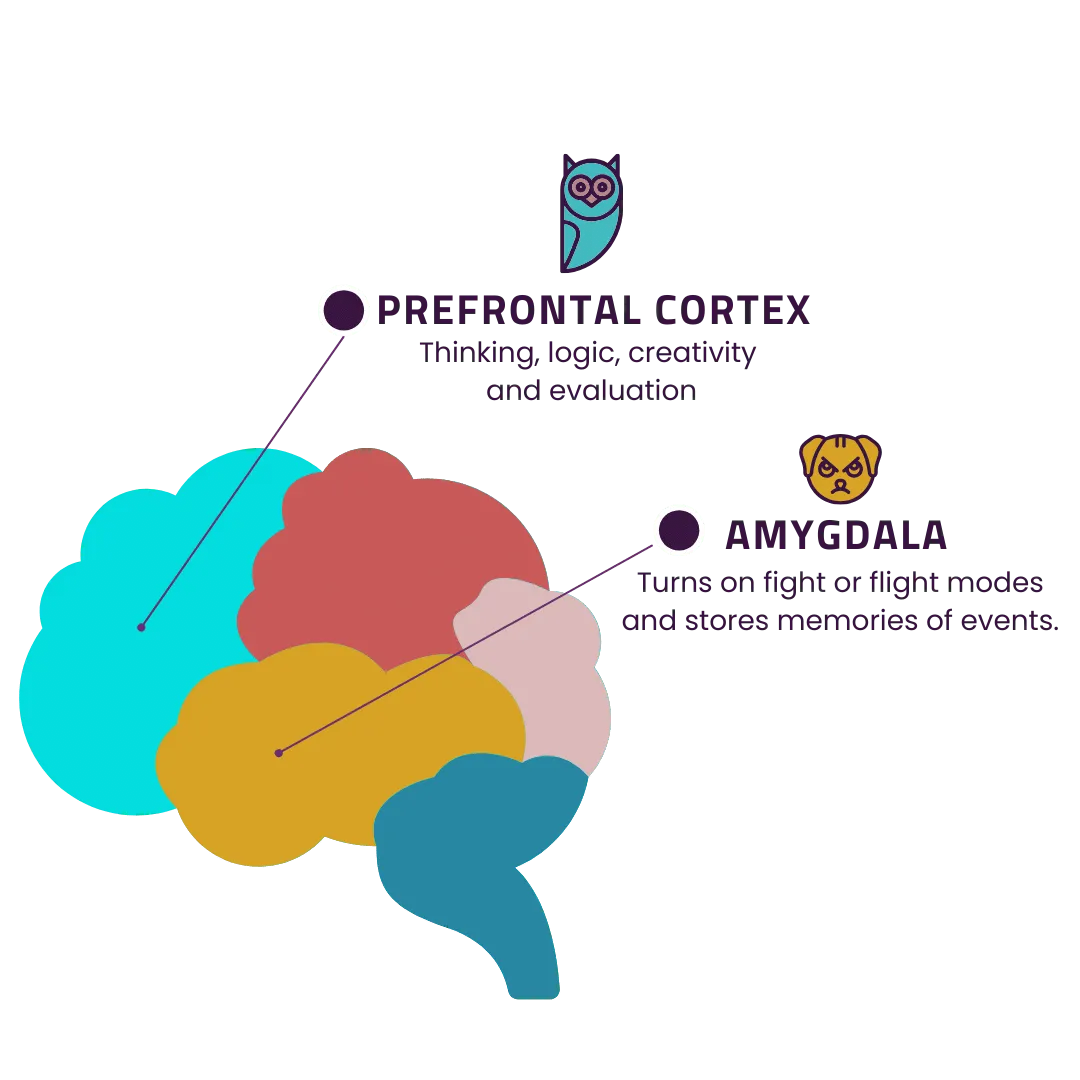
Debugging Our Mental Software
Ever been in a situation when your anger went from 0 to 100 in seconds? That's your amygdala springing into action, treating a mild threat as a catastrophic event. Your amygdala is like an overprotective “guard dog,” that suddenly wakes up and overreacts to a potential threat, as if it’s a life-or-death situation.
In the workplace, life-or-death situations are a rare event, so it’s our job to calm down this “guard dog” with proven techniques that allow your “wise owl,” or the brain’s prefrontal cortex— responsible for executive systems like decision-making—to take the reins and consciously choose a response. Learn more in our Free Guide, “Breaking Bad Decisions.”
Cultivating a Conscious Culture
At Conscious State University, we provide immersive workshops and online training using science-backed methodologies that empower your leaders and teams to calm their minds and create new thinking and emotional patterns. Our customized workshops and online training equip your people to:
Rewire Neural Pathways
Overcome Past Mental Programming
Improve Decision-Making
Develop Emotional Resilience
Collaborate Effectively
Reduce Workplace Stress
Increase Engagement
Cultivate Innovation


We help leaders and their teams to:
Improve decision-making and strategic thinking to navigate complex problems and make informed choices that align with their vision and goals.
Master a conscious mindset and breakthrough limiting beliefs, empowering team members to overcome obstacles, build resilience, and achieve lasting success.
Elevate leadership presence by fostering stronger relationships, managing conflicts, and inspiring their teams, while building a thriving company culture.
Cultivate work-life balance, while focusing on emotional intelligence, self-awareness, and mindset shifts that lead to increased fulfillment and success, both personally and professionally.
Request a Proposal
To gain further insight into Christie Turley’s in-person workshops, as well as Conscious State University’s online learning platform, request a proposal.
"Employees who participate in corporate wellness programs are 2.5 times more likely to be working there in 3 years."
Source: The International Foundation of Employee Benefit Plans (IFEBP)

About Conscious State University
Conscious State University was founded by Christie Turley, an executive coach with more than 20 years experience empowering leaders to maximize their peak performance potential, assisting Fortune 500 executives, advising on inclusion and belonging initiatives, and spearheading high-profile ventures. Christie is also trained in science-backed methodologies such as NLP, mindfulness, meditation, breathwork and other techniques to facilitate lasting transformations. Her holistic perspective helps each team player to reconnect with their purpose, so they can lead with consciousness and presence.
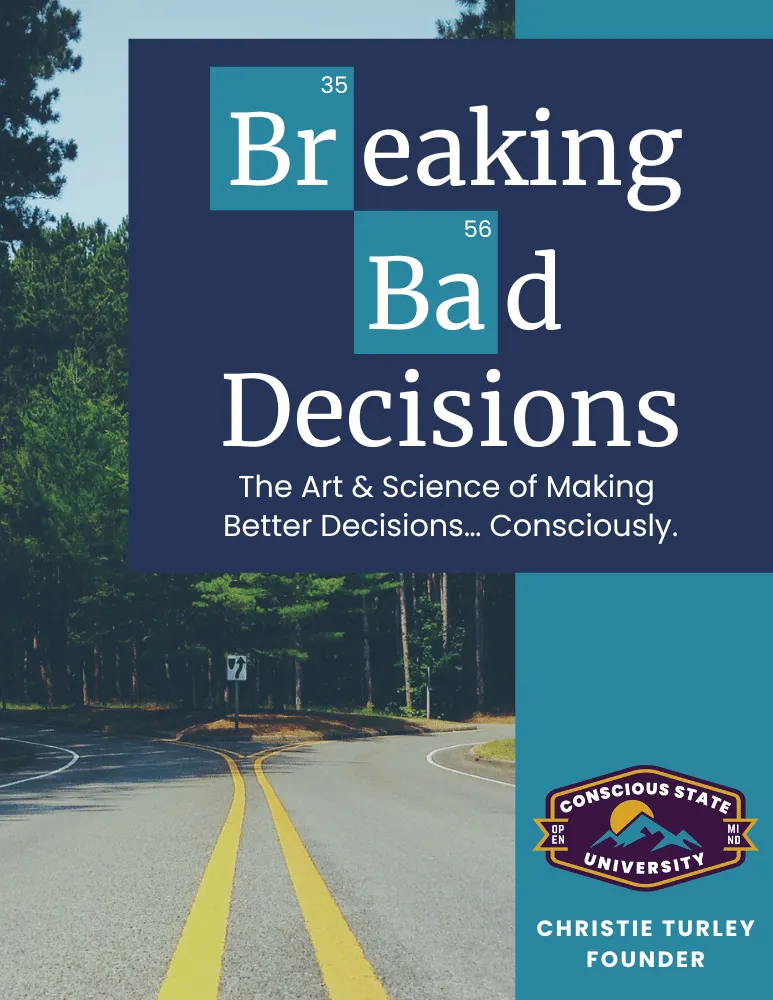
Breaking Bad Decisions
There’s nothing more vital to a leader's success than good decision-making. After all, decisions determine actions— and actions determine results. Learn more about the art & science of making better decisions by downloading the Free Guide, “Breaking Bad Decisions"...>>
Copyright Thrive Training, LLC 2020-2023, All Rights Reserved. 1812 W Sunset Blvd, Ste 1-114. Saint George, Utah 84770 USA
Copyright Thrive Training, LLC 2020-2023, All Rights Reserved. 1812 W Sunset Blvd, Ste 1-114. Saint George, Utah 84770 USA
